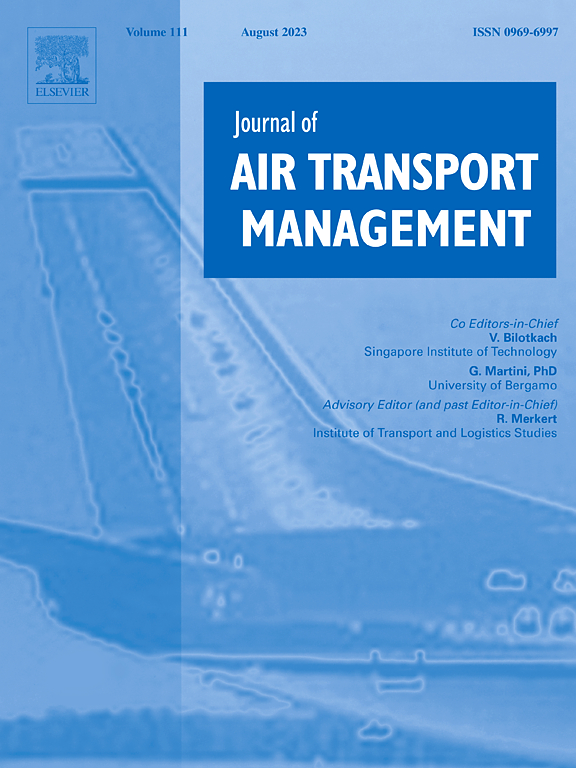Dare to Fly? Analyzing psychological reactions and travel attitudes of Chinese social media users post-aviation accidents through text mining
IF 3.6
2区 工程技术
Q2 TRANSPORTATION
引用次数: 0
Abstract
Background
Commercial air travel is essential to modern society, but aviation accidents can have profound psychological impacts. The public's emotional responses and attitudes toward air travel are shaped by factors such as the severity of the incident and its social repercussions.
Objectives
The study analyzes how the Chinese public's concerns, emotional responses, attributions, and attitudes toward air travel change following aviation accidents with varying severity and social impact. Additionally, it extends the application of the emotion-social information model in disaster scenarios and online behavior, providing valuable insights for crisis management.
Method
The study employs the LDA topic model to identify public concerns, sentiment analysis with an affective dictionary, and Naive Bayes for emotional attribution. Comments before and after the incidents were analyzed using Wilcoxon rank tests to assess changes in attitudes toward air travel.
Results
Public attention focused on victims, causes, and crew responses. Severe accidents elicited sadness, while less severe incidents prompted disgust and fear. Positive societal impacts from accidents improved emotions but did not significantly affect travel attitudes. Negative emotions led to a notable shift in attitudes toward air travel, while positive emotions had a limited effect.
Conclusions
The study provides valuable insights into the emotional dynamics following aviation accidents, enhancing the understanding of the emotion-social information model. It highlights the lasting impact of negative emotions on travel attitudes and the limited influence of positive emotions, with implications for psychological interventions and crisis management.
敢飞吗?通过文本挖掘分析中国社交媒体用户在航空事故后的心理反应和旅行态度
商业航空旅行对现代社会至关重要,但航空事故会产生深远的心理影响。公众对航空旅行的情绪反应和态度受到事件严重性及其社会影响等因素的影响。目的:研究分析不同严重程度和社会影响的航空事故后,中国公众对航空旅行的关注、情绪反应、归因和态度是如何变化的。此外,它扩展了情绪-社会信息模型在灾难场景和在线行为中的应用,为危机管理提供了有价值的见解。方法采用LDA主题模型识别公众关注,情感词典进行情感分析,朴素贝叶斯进行情感归因。使用Wilcoxon等级测试对事件前后的评论进行分析,以评估对航空旅行态度的变化。结果公众的注意力集中在受害者、原因和船员的反应上。严重的事故会引起悲伤,而不那么严重的事故则会引起厌恶和恐惧。事故带来的积极社会影响改善了情绪,但对旅行态度没有显著影响。负面情绪导致人们对航空旅行的态度发生了显著变化,而积极情绪的影响有限。结论本研究为航空事故后情绪动态提供了有价值的见解,增强了对情绪-社会信息模型的理解。它强调了负面情绪对旅行态度的持久影响和积极情绪的有限影响,对心理干预和危机管理具有启示意义。
本文章由计算机程序翻译,如有差异,请以英文原文为准。
求助全文
约1分钟内获得全文
求助全文
来源期刊

Journal of Air Transport Management
TRANSPORTATION-
CiteScore
12.40
自引率
11.70%
发文量
97
期刊介绍:
The Journal of Air Transport Management (JATM) sets out to address, through high quality research articles and authoritative commentary, the major economic, management and policy issues facing the air transport industry today. It offers practitioners and academics an international and dynamic forum for analysis and discussion of these issues, linking research and practice and stimulating interaction between the two. The refereed papers in the journal cover all the major sectors of the industry (airlines, airports, air traffic management) as well as related areas such as tourism management and logistics. Papers are blind reviewed, normally by two referees, chosen for their specialist knowledge. The journal provides independent, original and rigorous analysis in the areas of: • Policy, regulation and law • Strategy • Operations • Marketing • Economics and finance • Sustainability
 求助内容:
求助内容: 应助结果提醒方式:
应助结果提醒方式:


